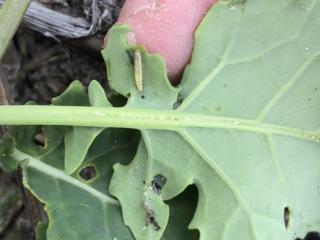Diamondback moth caterpillars are in canola
- Scaddan
- Esperance

Rachel Minett (Primaries CRT) has reported finding diamondback moth (DBM) caterpillars in a 4 leaf Trident canola crop near Scaddan. One in 30 plants was found to have 1 DBM caterpillar.
Monica Field (Farm and General) has observed canola at the 4-6 leaf stage west of Esperance with chewing damage from DBM. The damage was very patchy, but with the recent warm weather continuing the crop will be monitored for DBM build up.
DBM caterpillars are pale green, cigar-shaped and up to 12mm in length. They wriggle violently when disturbed and can drop down on a fine thread.
Damage from these grubs appears as chewed leaves, buds and flowers with the leaf chewing ranging from irregular holes in leaves to extensive leaf damage.
DBM caterpillar activity should slow down in cold, wet weather conditions and then ramp up in spring.
Growers and consultants are advised to monitor for DBM, especially from August onwards, by doing at least four lots of ten sweeps with an insect net at various locations in each crop.
DBM caterpillars drop from plants when disturbed, and bashing some plants, especially those with holes in leaves, over an ice cream container is a good initial indication of their presence if you don’t have a sweep net handy.
DBM are difficult to control because they breed prolifically and insecticide sprays have limited coverage in advanced canola canopies.
Thresholds for control are:
• pre-flowering (stressed crop) - 30 or more grubs per 10 sweeps
• pre-flowering (no stress) - 50 or more grubs per 10 sweeps.
For more DBM information refer to:
- DPIRD’s 2020 PestFax Pre-season Issue Diamondback moth caterpillars are being found in the ground bridge article
- DPIRD’s Diagnosing diamondback moth page
- GRDC's Diamondback moth fact sheet
- GRDC’s Managing diamondback moth video.
For more information on canola aphids contact Svetlana Micic, Research scientist, Albany on +61 (0)8 9892 8591 or Alan Lord, Technical officer, South Perth on +61 (0)8 9368 3758.
Article author: Cindy Webster (DPIRD Narrogin).
